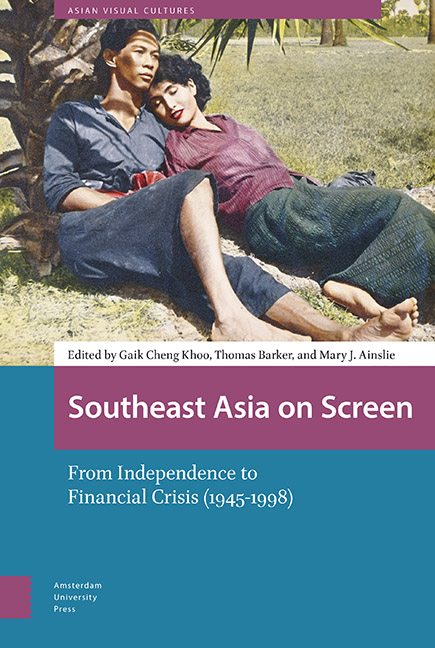Book contents
- Frontmatter
- Contents
- List of Illustrations
- Introduction: Southeast Asia on Screen: From Independence to Financial Crisis (1945–1998)
- Section 1 Independence and Post-World War II Filmmaking: Nation-building, Modernity and Golden Eras
- Section 2 Key Directors
- Section 3 Popular Pleasures
- About the Authors
- Index
8 - Ratana Pestonji and Santi Vina: Exploring the ‘Master’ of Thai Cinema during Thailand's ‘American Era’
Published online by Cambridge University Press: 20 November 2020
- Frontmatter
- Contents
- List of Illustrations
- Introduction: Southeast Asia on Screen: From Independence to Financial Crisis (1945–1998)
- Section 1 Independence and Post-World War II Filmmaking: Nation-building, Modernity and Golden Eras
- Section 2 Key Directors
- Section 3 Popular Pleasures
- About the Authors
- Index
Summary
Abstract
In recent years there has been a surge of interest in and recognition of post-World War II Thai filmmaker Ratana Pestonji (1908-1970), who often takes pride of place in narratives of Thai film history as a rare early Thai auteur untouched by the trappings of commercial filmmaking and bravely fighting against the monopolizing Hollywood system. This chapter seeks to clarify Pestonji's activities during the crucial and politically complex 1950s post-war period. Drawing largely upon historical sources and accounts from America, the chapter highlights Pestonji's close relationship with Hollywood filmmakers based in Thailand, suggesting that Pestonji's history and relationship with Hollywood studios in the early 1950s could potentially undermine posthumous nationalist constructions of this filmmaker.
Keywords: 1950s, Thailand, Ratana Pestonji, America, SANTI VINA
To scholars of Thai film history, director Ratana Pestonji (1908-1970) needs little introduction. Born on 22 May 1908 at Rongmeung Road, Bangkok, Thailand, Ratana was of South Asian origin and spent time studying in both India and the UK. Exhibiting a strong interest and talent for photography and filmmaking from an early age, Ratana graduated from the UK in 1932 with a degree in mechanical engineering and continued to enter and win amateur photography competitions throughout his studies. Returning to Thailand in the late 1930s, Ratana then further explored his interest in filmmaking by taking photographs and recording short film reels in Thailand during World War II, later collecting an award for his short film Tang (Pestonji, 1937) at a film festival in Glasgow, resulting in a now-infamous picture of him receiving the prize from Alfred Hitchcock in 1937. History then records his ‘big break’ as cinematographer for director Prince Bhanu Yugala, a keen pre-World War II filmmaker who founded the production company Thai Film Company. Ratana eventually branched out alone, founding the Far East Film Company Ltd around early 1953 and making a small number of highly lauded films throughout the 1950s and 1960s before his death in 1970.
- Type
- Chapter
- Information
- Southeast Asia on ScreenFrom Independence to Financial Crisis (1945–1998), pp. 171 - 192Publisher: Amsterdam University PressPrint publication year: 2020

